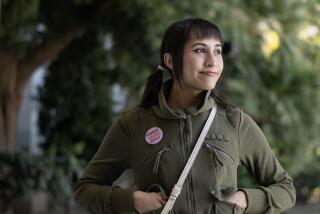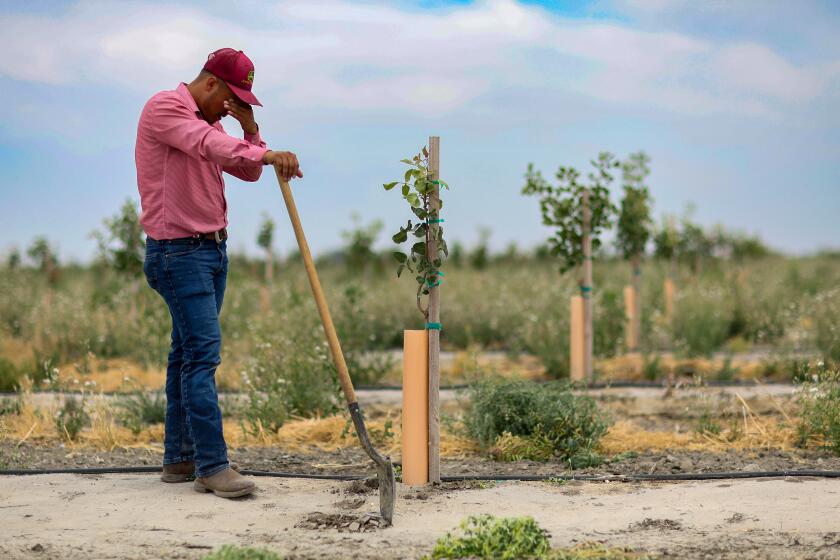A Round-Trip Ticket to Greater Understanding : Contest: An essay describing how a visit to South Korea changed her perceptions wins an African-American student another chance to learn.
Last fall, Kaia Niambi Shivers traveled 6,000 miles to South Korea, a trip that marked the beginning of her journey to bridge a gulf of cultural misunderstanding and ignorance back home in Los Angeles.
Now, Shivers, who turns 18 today, is preparing for her second trip to South Korea, her reward as one of the two grand-prize winners in a national essay contest sponsored by the Korea Society/Los Angeles.
In her essay, Shivers wrote about her earlier resentment of Korean-American merchants, a resentment she later realized was based on a lack of understanding of Korean culture and the often arduous path that led Korean-Americans to work in her neighborhood.
“I can admit that I wasn’t too fond of Korean-Americans in my community,” Shivers wrote. “I felt like a criminal when they followed me in swap meets, liquor stores and beauty shops. . . . Many Korean merchants refused to return the support given to them” by customers who shopped in their stores.
But Shivers’ perceptions changed dramatically during her first visit to Seoul.
In October, Shivers, former student body president at Washington Preparatory High School, was one of 10 African-American students from South-Central Los Angeles who spent two weeks in South Korea on an educational program sponsored by a Korean Christian organization.
“When I went to Korea I found that we had so much in common,” Shivers said. African-Americans and Koreans share a history of hardship and oppression, a strong work ethic, respect for education, a willingness to sacrifice for their children and a deep spirituality, Shivers said.
She wrote that after her trip she realized problems between African-Americans and Korean-Americans are based on a “lack of communication and cultural ignorance. Koreans are not mean and nasty and African-Americans are not criminals. It was the misunderstanding of both groups that widened the gap between us.”
At the awards ceremony on Thursday, Shivers said: “Most people (in my community) come across Koreans only as merchants and don’t have a chance to see the Korean culture, music, history and other aspects. My experience taught me that we must not limit ourselves and our perceptions of other cultures.”
More than 2,500 high school students from across the country submitted essays on the theme “My Images of Korea and Koreans: Towards a New Understanding.” Shivers and Keri Lee Nelson, of Minnesota, won the grand prizes.
Another 41 students, including 10 from Los Angeles and Orange counties, won scholarships ranging from $1,000 to $250 for their essays
“The essay contest gave me an opportunity to express how my attitudes have changed,” Shivers said. “Maybe I didn’t change 50,000 people but I did change myself and that’s how you have to start.”
Two other local winners, Jane Park, 15, and Rocio Quinones, 17, also emphasized the need to question prevailing images of Koreans.
“The stereotypes people have of Korean-Americans are totally different from the reality,” said Park, a student at the Marlborough School in Los Angeles. “Since the riots, many people think Korean-Americans just have liquor stores and don’t worry about their families. But the whole reason why they work so hard is for their families.”
Park, who wrote about the difficulty and rewards of weaving the Korean and American threads of her background into one identity, said respect between people of different ethnic backgrounds is built on the willingness to listen to what others say about themselves.
In her essay, Quinones wrote about how a Korean-American friend helped her see the experiences of her parents, who emigrated from Peru, in a new light.
“Our situations were so similar,” Quinones said. “The families came here to give better things to their children.”
Craig S. Coleman, executive director of the Korea Society in Los Angeles, said information on Korea and other Asian countries is “generally very weak or not available” in U.S. schools.
Shivers said she is looking forward to meeting more Koreans her age when she and her father travel to South Korea next month. Whether her stomach is ready for another round of spicy Korean food is another question.
“Sometimes you just have to bite the bullet, eat it and be appreciative,” she said.
More to Read
Sign up for Essential California
The most important California stories and recommendations in your inbox every morning.
You may occasionally receive promotional content from the Los Angeles Times.






